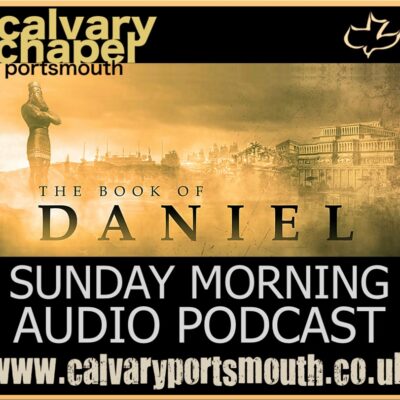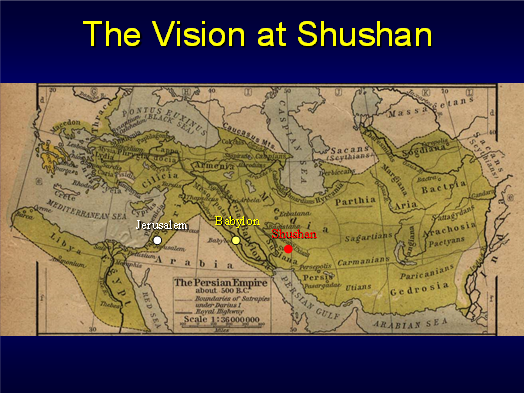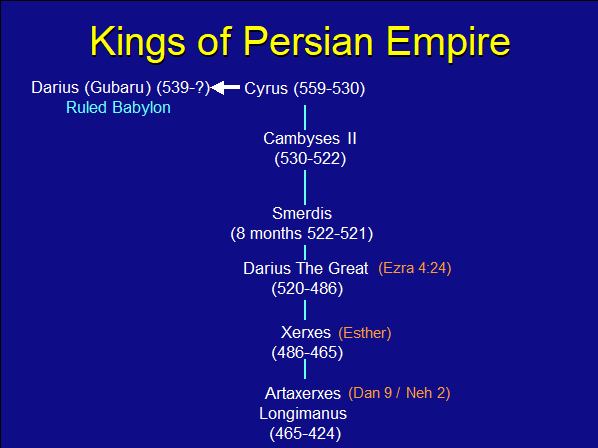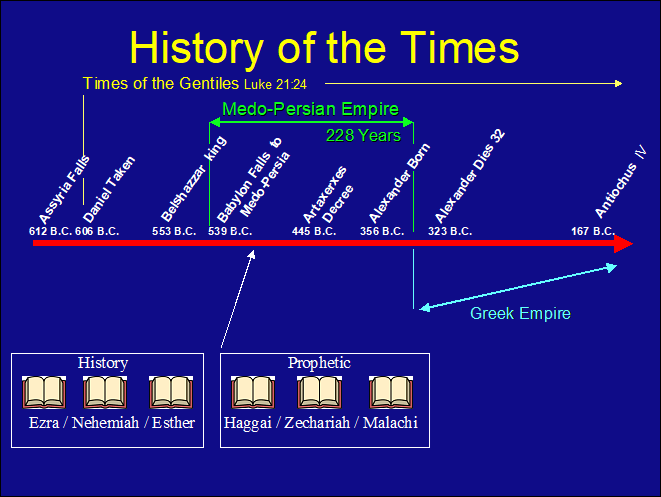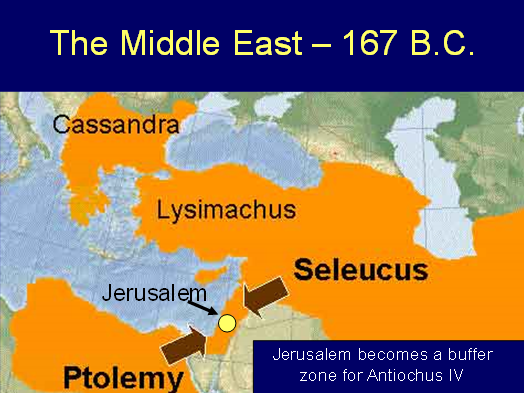This teaching on Daniel chapter 8 was given by Pastor Barry Forder at Calvary Portsmouth on Sunday 13th June 2021.
DANIEL CHAPTER 8
Daniel 8:1
In the third year of the reign of king Belshazzar a vision appeared unto me, even unto me Daniel, after that which appeared unto me at the first.
It has been about two years since Daniel’s first vision that we looked at in the previous chapter. The year is around 550 B.C. and Daniel is about 69 years old.
Daniel 8:2
And I saw in a vision; and it came to pass, when I saw, that I was at Shushan in the palace, which is in the province of Elam; and I saw in a vision, and I was by the river of Ulai.
Shushan (also called Susa) was at this time a province of Babylon in the area we would call Iran today. It was about 230 miles east of Babylon, 150 miles north of the top of the Persian Gulf. It had been the capital city of the Elamites, and would later become the capital and main residence of the Persian kings. It is where the action of the book of Esther takes place, and also where Nehemiah was serving as a cupbearer to king Artaxerxes. Because it was not a place of great importance at this time, some commentators have felt that Daniel was actually in Babylon and merely ‘transported’ to Shushan in his vision. However, I believe that Daniel was actually there for the following reasons: Firstly the grammar would seem to imply that Daniel was at Shushan when he saw the vision, not that in the vision he saw Shushan. The simple fact that Daniel identifies the place as Shushan strongly suggests that he was familiar with it, and therefore must at some time have visited not only the city, but also the palace. If he did visit it at some point then why not here and now?
Secondly, as we saw in chapter 5, Belshazzar doesn’t immediately think of Daniel when he sees the writing on the wall; yet at the end of this chapter we find that Daniel was still working for the king. An obvious solution to this ‘problem’ is that whilst Daniel was still in the service of the king, he was conducting his duties elsewhere, and hence ‘out of sight, out of mind’ as the old adage goes.
Elam was one of the sons of Shem (Gen 10:22) who had settled in this area after the flood.
Daniel 8:3
Then I lifted up mine eyes, and saw, and, behold, there stood before the river a ram which had two horns: and the two horns were high; but one was higher than the other, and the higher came up last.
In verse 20 we will be told that this ram with two horns represents the kings of Media and Persia. The fact that one horn is higher than the other speaks of the fact that Persia was stronger than Media, and Persia started its rise to power after Media. We saw a similar idiom in the previous chapter with the bear being raised up on one side (Dan 7:5). Interestingly enough, the ram had long been associated with the Persian kingdom, both in mythology and practice. The Persian kings would take off their royal crown and wear a ram’s head when they went into battle. In ancient cultures, Persia was associated with Aries in the Zodiac, the Ram.
Daniel 8:4
I saw the ram pushing westward, and northward, and southward; so that no beasts might stand before him, neither was there any that could deliver out of his hand; but he did according to his will, and became great.
As Daniel looks on, he sees this ram pushing in three directions, west, north and south. History confirms that these were the directions the Medo-Persian army went in. East of Persia was India, which remained untouched by the Persian kings. At the height of the Persian empire, Xerxes fielded two and a half million men in his army and ‘none could deliver out of his hand’.
Daniel 8:5
And as I was considering, behold, an he goat came from the west on the face of the whole earth, and touched not the ground: and the goat had a notable horn between his eyes.
As Daniel was watching and thinking this through (remember the Meads and Persians were subservient to the king of Babylon at this time, and had been all of Daniel’s life; it must have been hard to grasp that Babylon would loose its dominance) suddenly, a male goat comes flying from the west and has an impressive horn between its eyes.
Daniel 8:6-7
6 And he came to the ram that had two horns, which I had there seen standing before the river, and ran unto him in the fury of his power.
7 And I saw him come close unto the ram, and he was moved with choler against him, and smote the ram, and brake his two horns: and there was no power in the ram to stand before him, but he cast him down to the ground, and stamped upon him: and there was none that could deliver the ram out of his hand.
Verse 21 will tell us that this male goat is representative of the kingdom of Greece and verse 22 confirms that the ‘notable horn’ is the first king, who from history we know was Alexander the Great. This corresponds with the ‘belly and thighs of brass’ of the dream in chapter two and the leopard of the vision in chapter 7.
There had long bee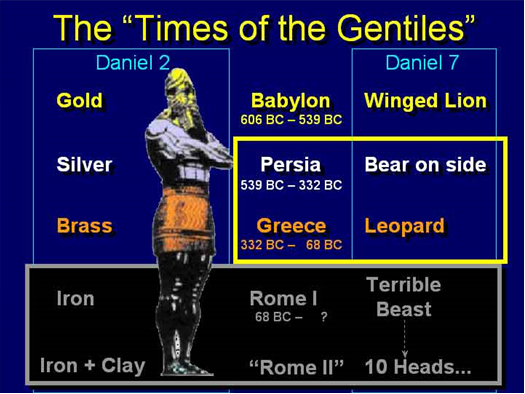 n rivalry between Medo-Persia and Macedonia (the area just to the north of Greece). Philip of Macedon, Alexander’s father, was murdered by a conspiracy, said to have been masterminded by Darius of Persia. Thus when Alexander came to the throne as a young 19/20 year old, he needed little encouragement in going after Darius and the Persians; whom he duly defeated after a few decisive battles. Alexander’s kingdom surpassed anything that had existed up to this time, and in just 6 years it stretched all the way from Greece to India. If Persia was associated with a ram, then Greece was certainly associated with a goat. Various stories in their folklore were centred around a goat, and Alexander’s son was named `Alexander Aegus’, the `son of the goat’. In addition, some of Alexander’s successors are represented on their coins with goat horns. For us this is history; but we should keep in mind how incredible this was for Daniel 200 years before any of this happened. It would be like someone telling us Iceland will rule the world!
n rivalry between Medo-Persia and Macedonia (the area just to the north of Greece). Philip of Macedon, Alexander’s father, was murdered by a conspiracy, said to have been masterminded by Darius of Persia. Thus when Alexander came to the throne as a young 19/20 year old, he needed little encouragement in going after Darius and the Persians; whom he duly defeated after a few decisive battles. Alexander’s kingdom surpassed anything that had existed up to this time, and in just 6 years it stretched all the way from Greece to India. If Persia was associated with a ram, then Greece was certainly associated with a goat. Various stories in their folklore were centred around a goat, and Alexander’s son was named `Alexander Aegus’, the `son of the goat’. In addition, some of Alexander’s successors are represented on their coins with goat horns. For us this is history; but we should keep in mind how incredible this was for Daniel 200 years before any of this happened. It would be like someone telling us Iceland will rule the world!
Daniel 8:8
Therefore the he goat waxed very great: and when he was strong, the great horn was broken; and for it came up four notable ones toward the four winds of heaven.
Greece got stronger and stronger under Alexander and he even succeeded in uniting the Macedonians and the Persians, enlisting many foreigners into his army. However, at just 32 years old, Alexander died. It is famously reported that on his deathbed he was asked: ‘to whom shall the empire be given’, he answered: ‘give it to the strong’. As we mentioned in the notes on Daniel 7:6, within a year of Alexander’s death, the empire was divided up between his four generals, Antigonus took Babylon (later to be conquered by Seleucus), Ptolemy took Egypt, Cassandra took Macedonia and Lysimachus took Asia Minor. (see map below).
Daniel 8:9
And out of one of them came forth a little horn, which waxed exceeding great, toward the south, and toward the east, and toward the pleasant land.
We are now introduced to a little horn, but it should not be confused with the little horn of the previous chapter. In chapter 7 the little horn was seen to come from among the 10 horns, which were identified as being the 10 kings of the revived Roman Empire that are yet to come. Here the little horn comes out of one of the 4 horns that arose after the death of Alexander the Great. So this horn is to come out of the remains of the Greek Empire; and we are told that he ‘waxed exceeding great’ toward the south, east and the pleasant land – Israel.
Daniel 8:10
And it waxed great, even to the host of heaven; and it cast down some of the host and of the stars to the ground, and stamped upon them.
As we continue in the remainder of this chapter, we will have described (prophesied) for us an event that occurred in 167 B.C. Yet some of the language seems to go beyond what we know happened historically and points to a future fulfilling, of which this then becomes a model. This is not uncommon in prophetic scripture and is given the label ‘The Law of Double Reference’: This law observes the fact that often a passage or a block of Scripture is speaking of two different persons or two different events that are separated by a long period of time. Thus we have in clear view the little horn, who we will discover was Antiochus Epiphanies, yet a shadow is cast into the distant future as Antiochus Epiphanies becomes a model or type of Antichrist.
Those familiar with the book of Revelation may have already recognised this verse as being remarkably similar to Revelation 12:3-4:“And there appeared another wonder in heaven; and behold a great red dragon, having seven heads and ten horns, and seven crowns upon his heads. And his tail drew the third part of the stars of heaven, and did cast them to the earth” (Rev 12:3-4). In our study on Revelation we noted that at the mid-point of the Tribulation (just prior to the commencement of the Great Tribulation) Satan will be thrown out of Heaven once and for all, but in so doing, he will ‘drag’ one third of the ‘stars’ (angels in this context) with him. Thus prophetically, this verse (Daniel 8:10) can be seen to be looking forward to that yet-future event; but that leaves the question of how it is to be understood in regard to Antiochus Epiphanies.
Finis Jennings Dake, in his reference Bible comments that the word ‘host’ is translated from the Hebrew word ‘tsaba’ which means ‘a mass of persons or things, especially organised for war’. Dake adds: “The words host and hosts are used 475 times of various armies of earth and heaven, as well as the mass of stars.” “The term host of heaven is used of the sun, moon, and stars; and here [i.e. in this verse] of the high priest, the priests and Levites. It is a technical term for the ministers of the temple. The host may also include the worshippers. They are pictured under the figure of stars of heaven. The fact that the host will be trodden under the foot of men proves it refers to the Jewish people on earth, and not literal stars of heaven”.
Therefore, if this is the case, this verse is prophesying that this little horn will stand up against the priests of the temple and attack the Levites and worshippers – something that we know from history (i.e. Josephus / 1 Maccabees), actually happened.
Daniel 8:11-12
11 Yea, he magnified himself even to the prince of the host, and by him the daily sacrifice was taken away, and the place of his sanctuary was cast down.
12 And an host was given him against the daily sacrifice by reason of transgression, and it cast down the truth to the ground; and it practised, and prospered.
Antiochus was a part of the Seleucid Empire that had come to power following the death of Alexander the Great. According to the book of 1 Maccabees in the Apocrypha, and other historical records, Antiochus IV was the 8th king of the Syrian dynasty, reigning from 175 – 164 B.C. He ascended to the throne after the death of his father and imprisonment (by Rome) of his elder brother, Seleucus Philopator. Yet Antiochus was not the rightful heir, for Seleucus had a son. However, by flattery and bribery Antiochus succeeded in becoming king. He invaded Egypt and defeated Ptolemy VI, but on his way back he stopped of at Jerusalem. Jerusalem was situated right in between the Seleucid and Ptolemaic empires, and acted as a ‘buffer zone’ in between the two rival kingdoms. As you can imagine, the Jews were not very enamoured by this and tried to resist. (For more, see notes on ch.11).
In response, Antiochus plundered and desecrated the temple and even went as far as sacrificing a pig on the alter. He tried to do everything he possibly could to offend the Jews as can be seen from the following record from 1 Maccabees:
“And the king sent letters by messengers to Jerusalem and the cities of Judah: he directed them:
– to follow customs strange to the land,
- to forbid burnt offerings and sacrifices and drink offerings in the sanctuary,
- to profane Sabbaths and feasts,
- to defile the sanctuary and the priests,
- to build alters in sacred precincts and shrines for idols,
- to sacrifice swine and unclean animals, and
- to leave their sons uncircumcised,
They were to make themselves abominable by everything unclean and profane, so that they [the Jews] should forget the law and change the ordinances. And whoever does not obey the command of the king shall die”
Antiochus put an idol in the temple and stopped the daily sacrifices. Once again we see here a model of what Antichrist will do. Jesus himself referred to this event as the ‘abomination of desolation’ and foretold it happening again (see Matthew 24). The fact that the ‘model’ happened just as Daniel had prophesied, and with such incredible detail, we can be absolutely certain that the ‘fulfilment of the model’ will happen just as Jesus said.
Daniel 8:13
Then I heard one saint speaking, and another saint said unto that certain saint which spake, How long shall be the vision concerning the daily sacrifice, and the transgression of desolation, to give both the sanctuary and the host to be trodden under foot?
The question that Daniel overhears being asked is ‘how long will this be allowed to go on for’?
Daniel 8:14
And he said unto me, Unto two thousand and three hundred days; then shall the sanctuary be cleansed.
In the previous verse Daniel overheard a question being asked. It is reasonable to assume that the answer given in this verse would be the response to that question. It is amazing therefore, as one browses the various commentaries on this verse, that not only do we have various ‘interpretations’ of what the ‘two thousand and three hundred days’ actually mean, but also what they are referring to! Probably the most incredible of these interpretations was by a man named William Miller. Miller, an American Baptist preacher and active Freemason, proposed that the days actually meant years, and that the sanctuary actually referred to the earth. Therefore, he concluded, after 2300 years the earth would be cleansed and Jesus would return. Miller became convinced that the 2,300 day/year period started in 457 B.C. with the decree to rebuild Jerusalem by Artaxerxes I of Persia; his first mistake was that the decree to rebuild Jerusalem was not given until the 20th year of Artaxerxes (445 B.C.) as we will see in the next chapter. However, according to his calculations, the period would end, and hence Christ would return, in 1843. Miller records, “I was thus brought… to the solemn conclusion, that in about twenty-five years from that time (1818) all the affairs of our present state would be wound up.” (Apology and Defence, William Miller, 11-12). As most people are aware, this did not happen. Yet from this ‘foundation’ came the Seventh Day Adventist movement. It is also worth noting that the JW’s also leaned on Miller’s ‘understanding’ of Bible prophecy. If Millar had checked his theory against the ‘whole council of God’, rather than take one verse out of context, it is unlikely he would have made this error in the first place.
So how are we to understand this verse? Clearly the reference is to how long the sanctuary in the Temple in Jerusalem was to lay desolate until it would finally be cleansed. So our period of time is up when the temple was cleansed, which we know was in the winter of 164 B.C.
The Maccabean Revolt
In 167 B.C. a Jewish priest, by the name of Mattathias, was so incensed by the desecration of the temple and the erecting of an idol in the holy place that, not only did he refuse to worship this idol, but also started killing the Hellenistic Jews* who did. (*Jews that had adopted the Greek culture and lifestyle). As a result of this, he and his five sons were forced to flee into the wilderness. After Mattathias’ death about one year later, his son Judas Maccabeus (whose name meant ‘hammer’) formed an army and led a revolt against Antiochus IV, which in 164 B.C. was eventually successful in overthrowing the Seleucid control of Israel. When the Jews finally entered the temple they found only one days supply of the consecrated olive oil that was needed to maintain the light on the great seven-branched lampstand called the ‘Menorah’. According to the Law of Moses this was to be kept continually burning. The Jewish Talmud records that the priests poured the oil into the seven lamps and lit them to bring forth light. Miraculously, to one days supply of oil burned for eight days – which was the length of time it took to press, prepare and consecrate new oil.
To commemorate this event the Jews added the Feast of Hanukkah, also called ‘Festival of Lights’ or ‘Festival of Rededication’ to their annual feasts. Whilst not specifically given by God, the validity of this feast is confirmed in John 10:22: “And it was at Jerusalem the feast of the dedication, and it was winter. And Jesus walked in the temple in Solomon’s porch.” (John 10:22-23). After this event, the Maccabees then founded the Hasmonean royal dynasty and established Jewish independence in the Land of Israel for about one hundred years, from 165 B.C. to 63 B.C.
So, with the historical background covered, we return to the question of what is meant by the 2300 days?
If we take them as literal 24-hour days, then we have a period just short of 7 years, which could correspond to the time between Antiochus’ first incursion into Jerusalem in 170 B.C. until the cleansing of the Temple by Judas Maccabeus in 164 B.C. However, we are told in verse 13 that the period of time in question is concerning the daily sacrifice, and the transgression of desolation, which didn’t occur until 167 B.C. The literal 24-hour day interpretation does not therefore satisfy the requirements. At first glance we now seem to be presented with a problem, that is until we realise that we are reading a translation. As good as the translators were (King James translators that is, – some of the modern ‘versions’ are shocking and completely change the meaning of things – beware!) on some occasions they have translated words into English to the best of their understanding but inadvertently confuse the issue. Such is the case here.
The Hebrew in this verse doesn’t use the word ‘day’ (Hebrew ‘Yom’), but rather ‘erev boker’, which would be literally translated as ‘evening-mornings’. It is easy to see why the translators thought evening-morning = day, however for the Jews who would think in terms of their sacrifices, 2300 evening-morning sacrifices would only equal 1150 days. Thus, this verse would seem to be saying that from the time the sacrifices were to be taken away (by Antiochus), there would be 1150 days, which is 110 days short of three and a half years. This fits with what we know from history and is consistent with what the text actually says.
Daniel 8:15-16
15 And it came to pass, when I, even I Daniel, had seen the vision, and sought for the meaning, then, behold, there stood before me as the appearance of a man.
16 And I heard a man’s voice between the banks of Ulai, which called, and said, Gabriel, make this man to understand the vision.
Daniel sought to understand, God wanted him to understand so Gabriel is instructed to make him understand. “Ask, and it shall be given you; seek, and ye shall find; knock, and it shall be opened unto you: For every one that asketh receiveth; and he that seeketh findeth; and to him that knocketh it shall be opened.” (Matt 7:7-8)
Daniel 8:17-19
17 So he came near where I stood: and when he came, I was afraid, and fell upon my face: but he said unto me, Understand, O son of man: for at the time of the end shall be the vision.
18 Now as he was speaking with me, I was in a deep sleep on my face toward the ground: but he touched me, and set me upright.
19 And he said, Behold, I will make thee know what shall be in the last end of the indignation: for at the time appointed the end shall be.
Here Daniel is told that the vision refers to the time of the end, yet as we have noted, all of these things have been fulfilled in history. Thus here we find confirmation that the events of this vision, whist having an historical fulfilment have a yet future fulfilment when another ‘little horn’ will desecrate the temple and place his image inside; the Jews (just like Judas Maccabeus and his family) will initially be forced to flee to the wilderness (cf Matt 24:15-21); and just as we were 110 days short of the three and a half years, Jesus said to the Jews: “And except those days should be shortened, there should no flesh be saved: but for the elect’s sake[i.e. the Jews] those days shall be shortened.” (Matt 24:22)
As we now continue with the interpretation, we will see even clearer allusions to the yet-future fulfilment of which Antiochus Epiphanies was just a model or type.
Daniel 8:20-22
20 The ram which thou sawest having two horns are the kings of Media and Persia.
21 And the rough goat is the king of Grecia: and the great horn that is between his eyes is the first king.
22 Now that being broken, whereas four stood up for it, four kingdoms shall stand up out of the nation, but not in his power.
As we have already noted, Medo-Persia was conquered by Alexander’s Greece, which itself then broke into four lesser kingdoms.
Daniel 8:23
And in the latter time of their kingdom, when the transgressors are come to the full, a king of fierce countenance, and understanding dark sentences, shall stand up.
Historically this was true of Antiochus, prophetically it is true of Antichrist.
Daniel 8:24
And his power shall be mighty, but not by his own power: and he shall destroy wonderfully, and shall prosper, and practise, and shall destroy the mighty and the holy people.
What Antiochus was, so will Antichrist be, yet ten fold more. Historically, Antiochus destroyed ‘impressively’ and fought against the holy people – the Jews. Prophetically Antichrist will be unlike anyone before him and will be allowed to prosper, i.e. do what he likes and launch such an attack on the Jews that the Nazi Holocaust will seem tame in comparison (cf Zech 13:8-9 / Jer 30:6-7). It is interesting to note that both for Antiochus and Antichrist they do not function by their own power, but will be supernaturally empowered by the ‘god of this world’ (2 Cor 4:4). Of Antichrist (the beast) we read: “And they worshipped the dragon which gave power unto the beast: and they worshipped the beast, saying, Who is like unto the beast? who is able to make war with him?” (Rev 13:4) (cf Eph 6:12).
Daniel 8:25
And through his policy also he shall cause craft to prosper in his hand; and he shall magnify himself in his heart, and by peace shall destroy many: he shall also stand up against the Prince of princes; but he shall be broken without hand.
Gradually the emphasis over the last few verses has shifted from Antiochus being the main focus with Antichrist in the background, to now in this verse, Antichrist being the focus. Antichrist will indeed magnify himself in his heart and bring about a false peace (cf. the white horse in Rev 6 with a bow – the sign of a covenant). Antichrist will stand up against the Prince of princes, the Lord Jesus Christ, but will be broken without hand: “And then shall that Wicked be revealed, whom the Lord shall consume with the spirit of his mouth, and shall destroy with the brightness of his coming:” (2 Thess 2:8).
Daniel 8:26
And the vision of the evening and the morning which was told is true: wherefore shut thou up the vision; for it shall be for many days.
If the historical portion of this vision has been fulfilled literally and with such accuracy, we can be sure that the prophetic (yet to come) elements will be fulfilled just as literally and precisely.
Daniel 8:27
And I Daniel fainted, and was sick certain days; afterward I rose up, and did the king’s business; and I was astonished at the vision, but none understood it.
It is hard for us to imagine how much this affected Daniel, yet if we really understand the impact of these things in the days we are living in, we too should be shaken out of our comfort zones and do two things: Firstly, pray for Israel and the Jews who will have to face what’s coming (Ps 122:6 / 137:5); Secondly: Preach the Word when it is convenient, and when it isn’t! (2 Tim 4:2). There is a dying world that needs to hear the good news that we have, the good news that there is a way of escaping the things that are coming (Luke 21:36).
May you be blessed and encouraged by this study.


